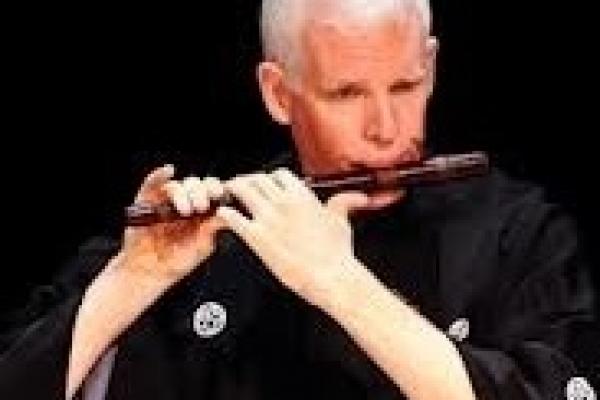
The Institute for Japanese Studies presents:
David Crandall
Noh Performer
Theatre Nohgaku
"Noh as Performance"
Flyer:
Abstract: Noh, the traditional stage art of Japan with a history going back nearly seven centuries, is a beautifully balanced genre characterized by allusive poetic text, ethereal music, gorgeous costumes, tightly controlled dance, and exquisitely carved masks. David Crandall, a professional performer who apprenticed with the Hōshō guild of noh actors in Tokyo, will present an engaging introduction to the practical aspects of noh performance, including vocal style, movement, musical instruments and masks. Focusing on the play Hagoromo (The Feathered Robe), Mr. Crandall will provide a glimpse into the apparent simplicity and subtle complexity of one of the world’s oldest living performance arts.
Bio: David Crandall is a writer, composer, translator, performer, and founding member of Theatre Nohgaku. He earned a double degree in Music Composition and Japanese Language & Literature from the University of Michigan. He began intensive training in noh in a post-graduate program at Tokyo University of Fine Arts and Music in 1979 under the tutelage of noh master Professor Hajime Sano. In 1986 he was admitted to the Hosho Noh Theater as an apprentice, studying with the 20th head of the Hosho guild, Hosho Fusateru. He continued his training and worked as a professional noh performer until moving back to the U.S. in 1991. While working as a translator, noh performer and workshop lecturer, Mr. Crandall has also been active as a composer and playwright, with an output that includes instrumental pieces, noh-inspired dance dramas, film scores, and children’s musicals.
Mr. Crandall’s Western-style compositions have been performed in concert by marimbist Keiko Abe (Juggler, 1980) and by the Tokyo Quintet (Yavanna 1981)). He has also composed film scores (Nighters, 1997; Crime and Punishment, 1998), and written the words and music for three children’s musicals (Johnny the King (2001); The Merchant of Cheat Street (2002); The Moon Robe (2003). His noh-based work includes the words and music for two original English-language dance dramas (Crazy Jane, 1983; The Linden Tree 1986); the music for Joanna Rotte’s The Beautiful Life of the Woman Komachi (2013) and the music for Carrie Preston’s Zahdi Dates and Poppies (2014). He has worked collaboratively with artists in other fields, including an original work titled MoOnviewing (1997) performed with butoh dancer Joan Laage, an adaptation of the noh play Tsunemasa performed with calligrapher Chiyo Sanada (2004), and many others. His English adaptations of noh plays include chamber versions of Atsumori (Atsumori) and Hagoromo (The Feathered Robe) and an adaptation of the dramatic Tama-no-Dan section from the play Ama (The Diver).
Mr. Crandall performs regularly as a noh chanter, dancer and instrumentalist both in his own projects and as a member of Theatre Nohgaku, of which he is a founding member. He presents workshops and lecture demonstrations on all aspects of noh (including how to write noh plays) at venues all over the world. As half of the folk duo Crandall and Kroes (toomanytrains.com), he also frequently performs Americana tunes throughout Western Michigan with his partner, Nick Kroes.
Mr. Crandall has translated and subtitled dozens of award-winning Japanese movies, documentaries, and television dramas, including Adrift in Old Age (U.S. International Film & Video Festival, Gold Camera, 2014 ); Radio (World Media Festival, Gold, 2014), Battlefield Tokyo (Monte Carlo Television Festival, Special Prize, 2014) and Goldfish (Prix Italia, 2010). Other translation work includes a book on kabuki by Kesako Matsui published in 2016 by the Japan Publishing Industry Foundation for Culture titled Kabuki: A Mirror of Japan.
In 2010, Mr. Crandall founded the Rogue River Noh Center in Belmont, MI. In 2013, he organized and hosted an exchange visit by Tesarugaku-no-kai, a noh training group based in Tokyo, which brought noh to Western Michigan for the first time. He frequently hosts retreats and provides a space and support for artists to develop new work and train in noh techniques.
Free and open to the public
This lecture event is supported in part by the OSU Department of East Asian Languages and Literatures and by a U.S. Department of Education Title VI grant to The Ohio State University East Asian Studies Center.
